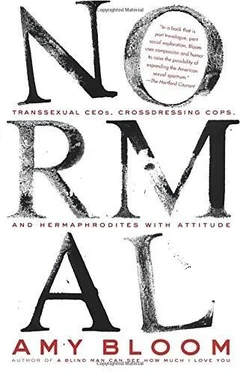Our categories and our descriptions are so narrow and self-protective that not only don’t we have words for the drive to crossdress, we don’t have any language to describe the mixture of attraction and envy that often leads these men to have sex with women while thinking of themselves as male lesbians, “men trapped in men’s bodies,” in Dr. Anne Lawrence’s words. For crossdressers, Ray Blanchard says, “it’s like they plug in the lamp and the toaster pops up. They emulate the women they want to have — some kind of confusion between attraction to a sexual object and being the object. Many see an attractive woman, get aroused and then envious. They cannot get their wires uncrossed.”
A brochure from the Fantasia Fair of 1986 encapsulates the crossdressers’ bind.
What is a Crossdresser?
An individual, usually heterosexual, who desires and needs to dress in the clothing of the opposite sex at different times throughout his or her life. This compulsive behavior generally starts at a young age and the individual struggles alone for many years with this closeted need. Cross-Dressing is not a sickness, but represents a person who enjoys expressing another aspect of his personality and gains both emotional and physical pleasure from this transition. It is not a hobby, but a necessity and Cross-dressing is for life.
This seems to me to be the heart of the crossdressers’ dilemma, and now the heart of mine in writing about them. Crossdressing is a compulsion, but somehow not a sickness. A good wife should tolerate it because the man has no choice, but it shouldn’t be too hard to tolerate because it is, after all, a gift. It is about enjoyment, it gives physical and emotional pleasure — and it’s a necessity. The necessity of crossdressing is frightening to the men and to their wives, and their wish to tame it, to dress it up as a preference and a superior personality, is understandable.
“We learn what everyone learns,” Jane Ellen Fairfax says. “Girls are now taught you can be anything you want to be. No one tells a little boy, ‘You can be a sweet, soft, and wonderful little boy and an astronaut.’ Men are still being trained — well, you know, as Virginia Prince [founder of Tri-Ess and one of the godmothers of crossdressing] says, ‘Men are always trying to become what women are content to be.’ ”
“What is it that women are content to be?” I ask.
“Oh, you know, they know when to give it a rest. They know when and how to quit. They can relax and be themselves.”
I do know. He means that in his vision, idealized and old-fashioned, women are like oceans, or like fields, or like horses, and men are sailors, farmers, and cowboys, and that is their curse and that is women’s blessing, although women may not realize it. It is exhausting to be a man, and delightful to kick off those demands and slip into something more comfortable. It no longer seems odd to me, when I am talking to the Fairfaxes, that they are middle-of-the-road Republicans; it seems odd only that this quirk, this habit of wearing women’s clothing, would make anyone think that they belonged at the same party as Queer Nation, Dykes on Bikes, and transsexual women who become lesbian feminists.
Jane Ellen says, “Crossdressers are not women, and they’re not trying to be women.” When he talks about crossdressers, he almost always says “they.” When he talks about his marriage, his practice, and his politics, he says “I.”
“A lot of men want to go there, to be our feminine selves, to slow down and stop striving.”
“It sounds like yoga,” I say.
Jane Ellen is silent. It sounds like yoga except for the two hours of preparation time. It sounds like yoga except that it begins in a man’s life as an erotic response and becomes an erotic fetish. Sometimes I put on lipstick when I’m tense. It makes me feel armored, less vulnerable to the world. That’s not the same thing. I don’t feel that the lipstick is essential to my being, that without it I must stay home, and even as I know that there is an erotic dimension to getting dressed up (it’s not just crossdressers who appreciate the rustle of a slip, the slide of a stocking), when the dressing and the garments are the fuel and the expression of one’s sexual wishes, it is about sex, and not gender. For all their talk of relaxation, the Fairfaxes are too smart to think, or to try to persuade me, that crossdressing is ordinary, or that it’s just a hobby. Fly-fishing is a hobby; spending two hours preparing yourself to walk through a mall or a hotel lobby, hoping — hoping to the point of anxiety and arousal — that you will be perceived as female, is not what anyone, not least the crossdressers themselves, thinks of as a hobby.
“Crossdressers’ desires do not map onto anything in our world,” Ray Blanchard says. “You will never know how they feel if you are not one of them. And they have to disconnect between reality and their fantasy. Otherwise, it’s too disruptive. It’s too disruptive to acknowledge that you wish your penis was part of your wife’s body and not yours. It’s too disruptive to acknowledge that this is a sexual compulsion — one that diminishes over time, to the point that you can begin to tame it and not be so driven by the sex part, but there are very few former crossdressers. Even when the sexual spark, the libido fades, the attachment and the need persist. Like in marriage.”
Heterosexual crossdressers are disproportionately represented among the retired military; they are often first-born sons, and often quite masculine-looking, which is why the rest of us struggle so with their appearance. Blanchard says, “All of these men will tell you, ‘I had to hide my femininity. I became a cop, a firefighter, a black belt in karate, a construction worker, in order to compensate, in order to put these fears to rest and to hide my true nature.’ ” Blanchard thinks that what the men fear is actually exposure and ridicule — exposure not of their own femininity but of their drive to crossdress. He thinks their insistence that their intensely masculine behavior is merely a screen for their deeply feminine natures helps them believe that their wearing of women’s clothes expresses this femininity rather than an erotic compulsion. “These are masculine guys, for the most part. There’s no contradiction between ‘I feel like a woman’ and ‘I drive a tank, fly combat, play tight end,’ but there is a contradiction between those activities and ‘I am a very feminine person and always have been.’ The past gets rewritten because of their enormous emotional need to believe in their own femininity as the source of the need to crossdress.”
This is the only world I know where heterosexual men argue that they are more feminine than they appear and their critics and judges argue that they are less.
It is Talent Night aboard the Holiday , and I am having dinner at the Rudds’ table before the show. Felicity and Merrie, a large, sweet engineering professor, take turns dominating the dinner conversation. There is a great deal that they both want me to understand, and they are also gratified, painfully gratified, by my attention, by the fact that I even think about them without horror. I come to see why so many women find themselves sympathetic to crossdressers: women are raised to be sympathetic, and protective toward the vulnerable, and there is something appealing, unexpected, and powerful about being a woman and sympathizing with a man not because he demands it and you must offer it but because you genuinely feel sorry for him, for his debilitating envy and his anxious and powerless state of mind. Heidi Klum and her supermodel crowd may feel sorry for helpless men, whipsawed by passion, every night of the week, but this is not a stance that society affords most women.
Читать дальше












